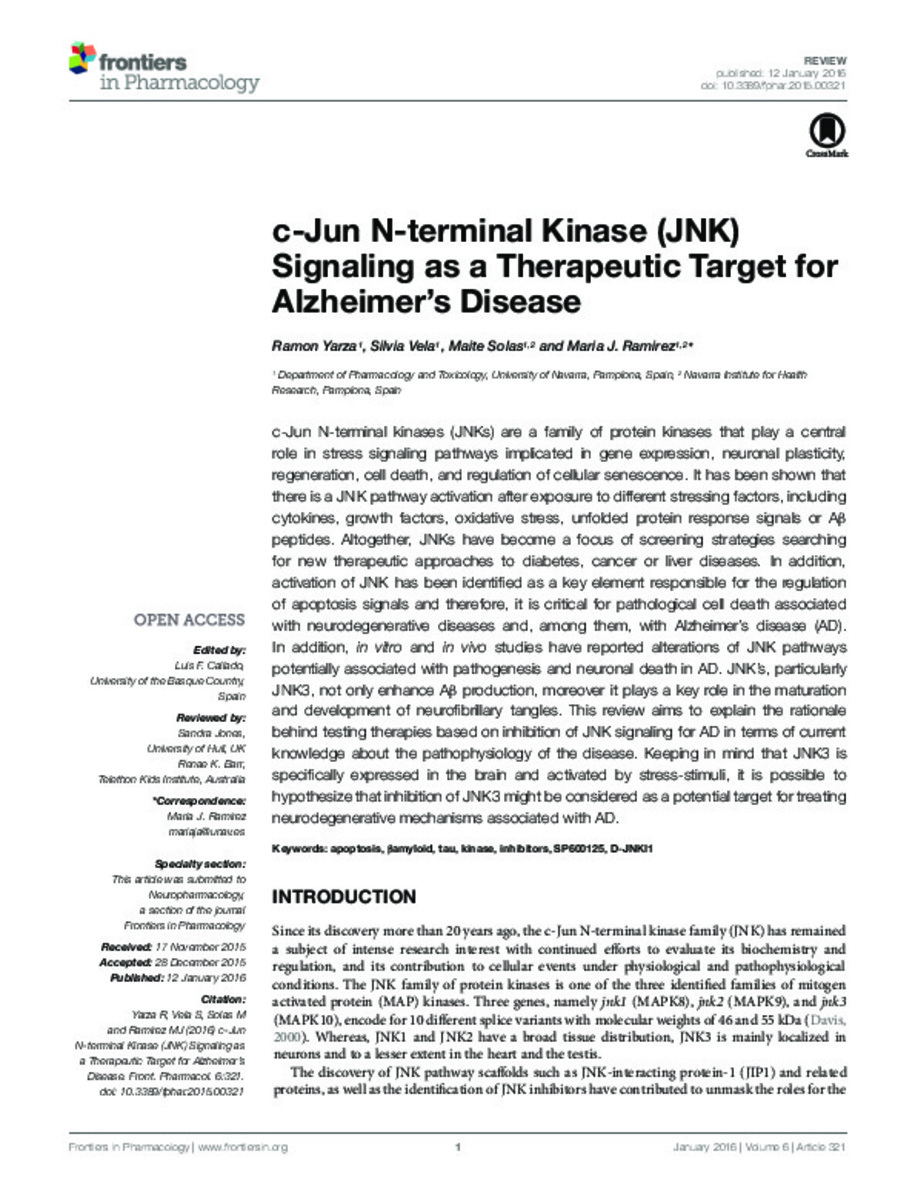Full metadata record
| DC Field | Value | Language |
|---|---|---|
| dc.creator | Yarza, R. (Ramón) | - |
| dc.creator | Vela-Lumbreras, S. (Silvia) | - |
| dc.creator | Solas, M. (Maite) | - |
| dc.creator | Ramirez, M.J. (María Javier) | - |
| dc.date.accessioned | 2016-02-11T16:40:31Z | - |
| dc.date.available | 2016-02-11T16:40:31Z | - |
| dc.date.issued | 2016 | - |
| dc.identifier.citation | Yarza R, Vela S, Solas M and Ramirez MJ. c-Jun N-terminal Kinase (JNK) signaling as a therapeutic target for Alzheimer’s disease. Front Pharmacol 2016;6:321 | es_ES |
| dc.identifier.issn | 1663-9812 | - |
| dc.identifier.uri | https://hdl.handle.net/10171/39919 | - |
| dc.description.abstract | C-Jun N-terminal (JNKs)are family of protein kinase that play a central role in stress signaling pathways implicated in gener expression, neuronal plasticity, regeneration, cell death, and regulation of dellular senescence. It has been shown that there is a JNK pathways activation after exposure to different stressing factors, including cytokines, growth factors, oxidative stress, unfolded protein responde signals or Aβ peptides. Altogether, JNKs have become a focus os creening strategies searching for new therapeutic approaches to diabetes, cancer or live diseases. In addition, activation of JNK has been identified as a key element responsable for the regulation os apoptosis signals and therefore, it is critical for pathological cell death associated with neurodegenerative diseases and, among them, with Alzheimer's disease (AD). In addition, in vitro and in vivo studiesb have reported alterations of JNK pathways potentially associated with pathogenesis and neuronal death in AD. JNK's, particulary JNK3, not only enhace Aβ production, moreover it plays a key role in the maduration and development of neurofibrillary tangles. This review aims to explains the rationale behind testing therapies based on inhibition of JNK signaling for AD in terms of current knowledge about the pathophysiology of the disease. Keeping in mind that JNK3 is specifically expressed in the brain and activated by stress-stimuli, it is possible to hypothesize that inhibition of JNK3 might be considered as a potential target for treating neurodegenerative mechanisms associated with AD. | es_ES |
| dc.language.iso | eng | es_ES |
| dc.publisher | Frontiers Media | es_ES |
| dc.rights | info:eu-repo/semantics/openAccess | es_ES |
| dc.subject | Apoptosis | es_ES |
| dc.subject | βamyloid | es_ES |
| dc.subject | Tau | es_ES |
| dc.subject | Kinase | es_ES |
| dc.subject | Inhibitors | es_ES |
| dc.subject | SP600125 | es_ES |
| dc.subject | D-JNKI1 | es_ES |
| dc.subject | Materias Investigacion::Ciencias de la Salud::Terapéutica | es_ES |
| dc.title | c-Jun N-terminal Kinase (JNK) signaling as a therapeutic target for Alzheimer’s disease | es_ES |
| dc.type | info:eu-repo/semantics/article | es_ES |
| dc.description.note | Creative Commons Attribution License | es_ES |
| dc.editorial.note | This Document is Protected by copyright and was first published by Frontiers. All rights reserved. it is reproduced with permission | es_ES |
| dc.identifier.doi | http://dx.doi.org/ 10.3389/fphar.2015.00321 | es_ES |
Files in This Item:
Statistics and impact
Items in Dadun are protected by copyright, with all rights reserved, unless otherwise indicated.






